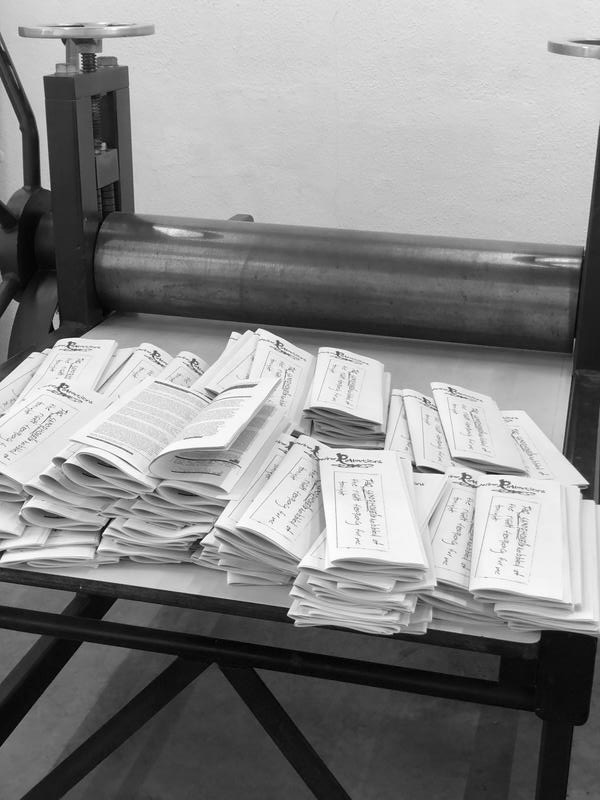ENDLESS RHYTHMIC EXPERIMENTATION
Rewire writing team, led by Laura Snapes, the Guardian's deputy music editor, created a zine over the weekend and launched on the last day of the festival.
Editorial Schedule
FRI PM interview → transcribe → translate
SAT PM write write write → design → riso-print
SUN AM fold → launch → distribute!

Koshiro Hino of Goat (JP) interviewed
Emerging from the underground music scene of Osaka since 2013, Goat is a Japanese band led by Koshiro Hino, a pivotal figure in experimental music in Japan. Their composition prioritises rhythm over melodic and harmonic structures, and captivating interplay of mechanical precision and human expression. It is characterised by the hypnotic rhythm produced through inventive techniques, such as guitar and bass employing muting methods. Comprised of Koshiro Hino on guitar, Atsumi Tagami on bass, Akihiko Ando on saxophone, Rai Tateishi on percussion and flute, and Akio Jeimus on the drum, the band embodies a daring exploration of sound, both urban and tribal, including endless experimentation of what's possible with instruments.
Before my departure from Japan, two friends mentioned “you’ll definitely love this band called Goat.” Later, I heard that a friend who is deep into literature and music, is moving to Poland, and becoming Goat’s agent in Europe. Eh? G-O-A-T was etched on my mind. The first time I heard Goat, my body was shocked by the tightly mechanical rhythm, compelling my head to sway intensely, not really dancing. The drummer drenched in sweat, challenging his physical limits. The pauses between notes create a sense of release, then the music resumes with more intensity. The mesmerising flute reminded me of the tune I heard on a mystical island, Sadoshima in Japan. That half-filled plastic bottle inside the bell of a saxophone creating a percussive sound that I absolutely adored. What the hell is going on? A constant feeling while you’re in Japan, the meticulous dedication to detail, and boundless experimentation – an element I dearly missed. Then, I got a text from another friend, “Hey, I’m becoming the new drummer for the band Goat. I’m coming to Rewire!”
How do you achieve both simplicity and complexity in your composition?
While it’s easy to create something complicated, my goal is not to make the composition complex. However, achieving rhythmic composition often leads towards complexity. If I approach complexity in a difficult way, the audience may find it perplexing, thus diminishing the joy in music. Similar to a great football player: enjoyment is essential. The concept is complex, but I don’t want it to be perceived as a complex thing. That’s why I keep it extremely simple and create complexity within simplicity.
With new members in the band, the composition style may evolve gradually. What are the core elements for the band that will not change?
Up until now, there haven’t been many changes. The initial compositions were centred around the original drummer, emphasising the core concept of complementing drums with guitar, base, and saxophone, as heard on our first two albums New Games (2013) and Rhythm & Sound (2015). Currently, I am experimenting while retaining this style. When the percussion and flute player Rai joined last year, I started considering incorporating melody into our music. Rai and our new drummer Jeimus both have improvisation backgrounds. I am exploring how to integrate improvisation into strictly composed music, and incorporate the phrases emerged from improvisation into our compositions. However, it’s important to balance between them, because when everything becomes improvised, it no longer reflects the essence of Goat.
Goat’s songs often stop and go explosively. Is this essential for Goat in the future?
The majority of the composition was based on this style, and I am good at this type of composition. Our third album Joy in Fear (2023) is shifting from that style. For example, the song with flute, there is definitely a feeling of tension, but it is different from the excitement generated by stop-and-go. I have been thinking about Terry Riley and Steve Reich’s approach since 2015, which is not about stopping suddenly and switching to another scene. I have been experimenting extensively with this approach in other projects, and I would like to incorporate it into Goat, in a band setting.
You expressed your excitement for another album when you released your third album in eight years. What would you like to experiment with in the future?
Now is the phase of further experimentation while keeping the identity of Goat. The band has a strong composition style, precise like a grid in a drum machine. When new members enter the team, new ideas emerge. Up until now, I tend to pass on the score and ask them to play exactly how it is. I would like to experiment with Rai and Jeimus coming off the rhythm. I want to incorporate their strengths, pick up interesting elements, and compose along that.
Would you like to say anything to Rewire?
We are not Goat from Sweden, nor Greece. We are Goat from Japan! We get wrong bookings a lot…